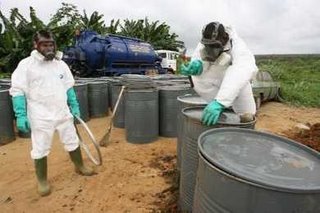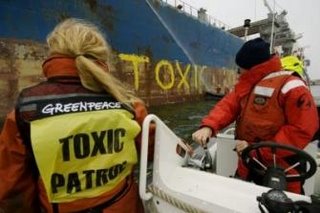 In one had to point to one organisation that had done more than any to demonise waste disposal and legitimise the flood of restrictive legislation on waste, Greenpeace would be a pretty good candidate.
In one had to point to one organisation that had done more than any to demonise waste disposal and legitimise the flood of restrictive legislation on waste, Greenpeace would be a pretty good candidate.Thus it is inevitable that, when a disaster arises in part as a result of the very legislation of which Greenpeace so much approves, they will be the last people to recognise the consequences of their own actions.
The disaster in question is a waste oil dumping scandal, involving the ship Probo Koala (pictured above), which has killed at least eight Africans, including children, and poisoned thousands of Ivory Coast residents, reported (sketchily) by Reuters via Toronto Star (which is equally uncomprehending of the underlying issues).
According to the agency's report, this "has given rare insight into the world's murky trade in waste, much of it toxic, in defiance of global trade laws", but it is to The Times that one must turn for more of the details of an incident, the genesis of which seems to go back to last July.
It was then, it appears, that the ship Probo Koala, carrying an amount of waste oil attempted to offload of it in Amsterdam – where, no doubt, the fastidious Dutch would have ensured its safe disposal. But according to the German magazine, Spiegel, Amsterdam Port Services (APS) refused to accept the waste because of high concentrations of a substance known as mercaptan.
This, The Times describes as "a poisonous residue of decaying crude oil", although it is also the odourant used in domestic gas supplies to warn of the presence of an otherwise odourless gas.
The waste, it turns out, was what is known as "Basle slops" - the residue from oil tank washing, although we are not given any detail of the origin. Doubtless, the waste generators found it easier to pass on the problem of disposal to the Greek owners of the Panamanian-registered Probo Koala – almost certainly paying substantial fees for the privilege.
Anyhow, it seems the master of the Probo Koala was instructed to dump the waste at a special facility – at an unspecified but doubtless high cost – which, we can deduce, would also have delayed the ship, the operator thus incurring a $250,000 (£131,000) penalty for its late arrival at the next port of call. Entirely predictably, therefore, the Probo Koala left Amsterdam with the waste on board, sailing out of the reach of the highly regulated Dutch waste disposal system.
 From there the disaster started to unfold when a small company, called Tommy, and wholly owned by the Puma Energy Group, in which the Ivorian President's family is reported to own shares, won the contract to accept the waste. Then, in late August, 500 tons of waste, which the operator insists was of low toxicity, was dumped at night at more than 11 sites across the Ivory Coast town of Abidjan.
From there the disaster started to unfold when a small company, called Tommy, and wholly owned by the Puma Energy Group, in which the Ivorian President's family is reported to own shares, won the contract to accept the waste. Then, in late August, 500 tons of waste, which the operator insists was of low toxicity, was dumped at night at more than 11 sites across the Ivory Coast town of Abidjan.The operator is a firm called Trafigura – a Dutch oil trading firm – which has a rather seedy background, having been was fined $17.9 million (£9.4 million) for its role in the UN's Oil-for-Food scandal,
Following the dumping, a stinking cloud of fumes hung over the city and around 9,000 people have complained of rashes, vomiting, diarrhoea, migraines and nosebleeds, while eight have died.
As a sequel, the dumping has led to angry street protests in Abidjan during which the country's Transport Minister was pulled from his car and beaten, the house of the director of Abidjan was burnt down and, on 6 September, most of the Ivorian Cabinet resigned, prompting President Laurent Gbagbo to ask his Prime Minister, Charles Konan Banny, to form a new government.
Now, with the Probo Koala in Estonia, the Estonian state prosecutor has refused to allow the ship to leave pending investigations, with a view to prosecution. Greenpeace activists have hooked themselves up to the ship's mooring lines to stop it leaving (picture below left).
Returning to the Reuters report, this highlights "activists" who "campaigned against the dumping of toxic waste in Africa and the developing world in the 1980s," noting that "regulations adopted in Basel in 1989 attempted to restrain the business." Without realising the inevitability of what it reports, the agency – in a piece that is closer to editorialising than objective reporting – then tells us that Greenpeace is complaining that "the worst practices are back".
 Instead of toxic waste, campaigners say the developed world is dumping old ships, often contaminated with asbestos and other poisonous chemicals, and electronic goods on poorer countries ill-equipped to deal with them. Reuters then cites Pierre Portas, deputy executive secretary of the Basel Convention Secretariat, who says, "Unfortunately, because in Europe and other places, legislation has been put in place, people were dreaming that this matter would disappear… But with globalisation, this has resurfaced, it is even on the increase."
Instead of toxic waste, campaigners say the developed world is dumping old ships, often contaminated with asbestos and other poisonous chemicals, and electronic goods on poorer countries ill-equipped to deal with them. Reuters then cites Pierre Portas, deputy executive secretary of the Basel Convention Secretariat, who says, "Unfortunately, because in Europe and other places, legislation has been put in place, people were dreaming that this matter would disappear… But with globalisation, this has resurfaced, it is even on the increase." According to Greenpeace, "unscrupulous recyclers" promise to find homes for the ever larger mountain of discarded electronic gadgets in the developing world. "The whole trend is about taking the waste out of the backyards of the West, just getting rid of it basically," said Zeina Alhajj, campaign coordinator for Greenpeace International.
The Basel Action Network, a US group campaigning for a crack-down on hazardous waste, said last year 500 containers of computers were being shipped into Lagos every month. As many as 75 percent of these ended up being dumped and burned, releasing hazardous fumes that can contain lead, cadmium, barium, beryllium, mercury and brominated flame retardants used in computer manufacture.
The United Nations estimates that 20 to 50 million tons of electronic waste is produced every year, and checks by a European watchdog last year showed that 48 percent of EU waste exports were illegal. "Consumerism has led to this problem, which we see with everything from ships, to computers to refrigerators... when you open places to trade, you also open them to illegal traffic," Portas says.
That, then is the "take" of Reuters but, as we have argued elsewhere, it is – in one sense – far more complex than that, but also much more straightforward. Basically, though, if you want to ensure that waste disposal is carried out properly and safely, you make it as simple and as cheap as possible. On the other hand, if you rule out simple and safe means of disposal, like landfill and ladle on highly restrictive and expensive regulation, you skew the costs of disposal and make economic export to less regulated countries.
All you do then is turn your back on the problem, prate about how "green" you are, and ignore the problems which unfold.
In essence, the Probo Koala disaster was one waiting to happen, one which was regulatory-driven, arising from well-intentioned idiots who have little idea of human psychology and the effects of commercial pressures and who suffer from the delusion that all you have to do to solve problems is make laws.
This, as many readers will recognise, is the classic EU delusion and it was indeed the EU which was one of the prime movers behind the Basle Convention. No doubt, the officials who piloted it though, and the Greenpeace activists who so enthusiastically supported it, sleep easily in their beds, entirely heedless of the likelihood that, because of their actions, many Africans – and doubtless others – now lie in their graves.
Others, of course, may think differently, but that is a matter of perspective.
COMMENT THREAD
